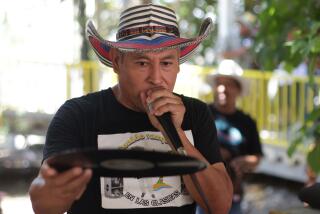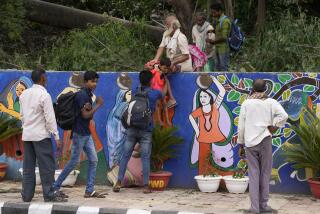Poverty Casts Pall on Film City’s Glitz
- Share via
BOMBAY, India — A tour of the 500-acre site finds imposing courtrooms, glittery shops, a church, mountain forest, even rickety shanties.
But it’s a movie lot, and nothing here is real. Except the poverty and hunger, its former owners say.
Hundreds of villagers from the Warli ethnic group say farmland that their people owned for centuries is being taken by “Bollywood,” India’s bustling Bombay-based movie industry, leaving them struggling to get by.
Across the hills of Film City -- the sprawling hub of Bollywood -- there are 16 studios where thousands of technicians work each day at dozens of lavish sets that are routinely built and demolished.
There are also wide swathes of empty land and, in pockets, a few remaining Warli villages.
“I was born here. My ancestors lived here. Now the film people want to take it all away,” said Narayan Lothde, a gardener and one of six men with regular jobs in his 300-person village in a corner of Film City.
The Warlis are the largest group among the estimated 200,000 “tribals” living in the suburbs of Bombay, also known as Mumbai. They say they have been forced from much of their land by real estate firms and gangsters who have ties to India’s movie business, whose annual output of 800 films trails only Hollywood in worldwide reach.
The Warlis are far more frightened of losing their livelihoods to government-backed movie executives than of the tigers that roam the hilly area at night, beasts that killed four Warli children and injured 11 last year.
The Film City site, along with stretches of forest that were cut down and became part of the city, once belonged to the Warlis.
“The tribals did not go to Bombay. Bombay went to them,” said Vithal Lad, who heads Jaag (Awaken), an aid group fighting for the rights of India’s often victimized indigenous ethnic groups.
“Now they are in danger,” he said. “They are being evicted from their lands where they have lived for centuries.”
S. Vimla, joint managing director of Film City, agreed to respond to written questions about the dispute, but did not respond to the Associated Press.
At Film City, almost everything is make-believe -- courts, a huge jail, shopping arcade, police station, church, shantytown, log cabin, a thickly forested mountain, a hospital, a helipad -- even a lake that sometimes doubles as the revered Ganges River.
Fancy cars cruise in on tree-lined roads to deliver stars. Actors dressed as doctors, beggars and police officers take smoking breaks or have lunch at crowded canteens.
A few miles away, Devi ka Pada village is another world.
Shirtless children chase roosters along narrow paths. Most of the men are away during the day, chopping firewood they sell to buy their families’ evening meals. Women wash clothes in dirty water in cow dung-caked homes.
There is a hand pump, but the water is salty. The fresh water well has gone dry.
“The film stars go every day down this road. Our children love them. But they have given us hunger and taken away our land,” Usha Kiran Dewde said. “Maybe they will soon ask us also to leave our homes and go away.”
Mahesh Bhatt, a leading filmmaker who visited the Warlis with a local volunteer group to bring donated food, expressed shock at the poverty.
“There is starvation in the entertainment capital,” Bhatt said in an interview. “There is a virtual world and, right there, there is starvation and apathy. It is a study in contemporary India.”
On his wedding day, a 22-year-old Warli, Ankush Lakhma Gorakh, painted the walls of his shack using leftover pink paint from a movie set. It was a day of rare celebration. Musicians played. Streamers of mango leaves fluttered in a colorful tent pitched for the guests. Asked how he would support his wife, Vanita, Gorakh said: “I don’t know yet. I will sell firewood. I will look after her.”
A few feet away stood a shanty with four pillars and no walls, a reminder of a terror-filled day earlier this year when authorities sent a bulldozer to the village.
“The bulldozer first rolled over our farms across the road. Then the men brought it here,” said Shankar Sonu Gajmal, 35. When people protested, an official “asked the policemen to drive the bulldozers over us too,” he said.
“We used to pay taxes, but when we showed them the papers, they just waved their hands and said, ‘Go away; we don’t recognize this,’ ” Gajmal said.
That official, who has transferred to another department, declined to comment. So did her successor.
At Film City, land once tilled by the Warlis has been converted into a permanent movie set -- of a tribal village.
More to Read
Only good movies
Get the Indie Focus newsletter, Mark Olsen's weekly guide to the world of cinema.
You may occasionally receive promotional content from the Los Angeles Times.










